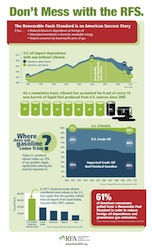 The renewable fuels industry is responding to the U.S. Environmental Protection Agency’s (EPA) notice of proposed rulemaking regarding 2013 Renewable Fuel Standard (RFS) required volumes. EPA proposes to set ethanol gallons at 14 million but where the real debate has lain is around the requirement for cellulosic gallons.
The renewable fuels industry is responding to the U.S. Environmental Protection Agency’s (EPA) notice of proposed rulemaking regarding 2013 Renewable Fuel Standard (RFS) required volumes. EPA proposes to set ethanol gallons at 14 million but where the real debate has lain is around the requirement for cellulosic gallons.
The Renewable Fuel Association (RFA) submitted comments with four key points:
1. EPA should revise its proposed 2013 cellulosic biofuel standard to better correspond with current expectations of actual 2013 cellulosic biofuel production volumes.
2. EPA should partially reduce the 2013 advanced biofuel standard, as sugarcane ethanol imports are unlikely to be available in sufficient volumes to meet the requirement.
3. Because there are legal and economical options available for surmounting the “blend wall”, the E10 saturation point should not be a factor in EPA’s decision-making process for 2013 RVO levels.
4. EPA should propose 2014 RFS standards as expeditiously as possible and ensure the 2014 RVOs are established no later than Nov. 30, 2013.
“To ensure the RFS continues to be implemented in the most effective way,” said Bob Dinneen, RFA CEO & president, “and we are calling on EPA to exercise its discretion to adjust the 2013 advanced biofuel standard. We do not believe the levels of sugarcane ethanol imports assumed by EPA are reasonable given current market conditions.”
POET-DSM is also encouraging EPA to set this year’s and future projections to accurately reflect the strong expected growth of cellulosic biofuel, and said in a statement,  “While cellulosic biofuel is on the verge of robust growth in commercial production, to avoid undercutting this growth, EPA’s regulations must provide regulatory and market support consistent with Congressional intent in enacting the RFS. Under this rulemaking, it is critical that EPA adhere to Congressional intent in enacting the RFS by adopting 2013 cellulosic biofuel obligations based on projections that accurately reflect the strong expected growth of cellulosic biofuel projection in 2013 and in the following years.”
“While cellulosic biofuel is on the verge of robust growth in commercial production, to avoid undercutting this growth, EPA’s regulations must provide regulatory and market support consistent with Congressional intent in enacting the RFS. Under this rulemaking, it is critical that EPA adhere to Congressional intent in enacting the RFS by adopting 2013 cellulosic biofuel obligations based on projections that accurately reflect the strong expected growth of cellulosic biofuel projection in 2013 and in the following years.”
The National Farmers Union (NFU) agrees that cellulosic and other advanced biofuels hold tremendous promise for farmers in providing a buffer for large fluctuations in commodity prices by diversifying the rural economy. According to the U.S. Department of Energy (DOE), the U.S. produces 1.2 billion tons of ag and forest waste each year. This is feedstock to produce about 85 billion gallons of biofuels or enough to replace 30 percent of America’s annual petroleum consumption.
“NFU strongly believes that the United States should make the development of renewable sources of energy our number one priority in reducing dependence on fossil fuels,” added NFU President Roger Johnson in the comments. “As part of this we encourage EPA to incentivize the renewable fuels industry and American agriculture by creating ambitious targets for renewable energy production.”

